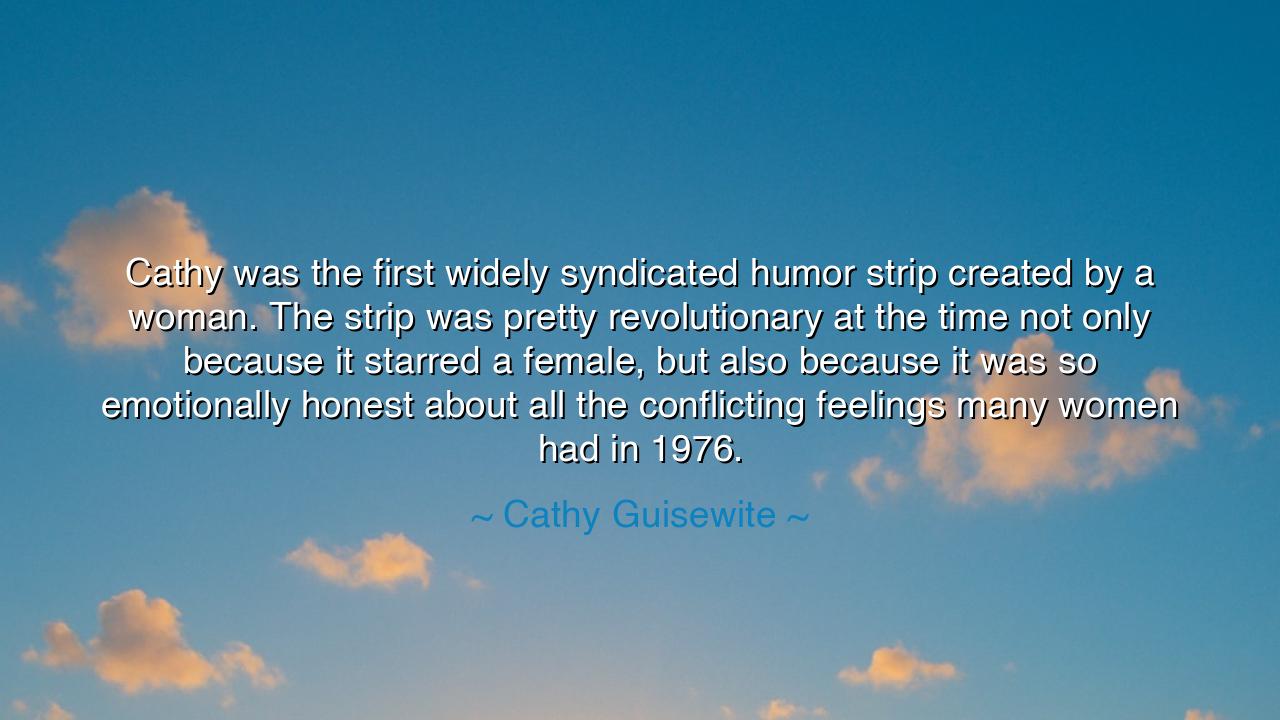
Cathy was the first widely syndicated humor strip created by a
Cathy was the first widely syndicated humor strip created by a woman. The strip was pretty revolutionary at the time not only because it starred a female, but also because it was so emotionally honest about all the conflicting feelings many women had in 1976.






The words of Cathy Guisewite—“Cathy was the first widely syndicated humor strip created by a woman. The strip was pretty revolutionary at the time not only because it starred a female, but also because it was so emotionally honest about all the conflicting feelings many women had in 1976”—shine as both testimony and triumph. They speak not only of a comic strip but of a moment in human history when truth and humor joined hands to reveal the soul of a generation. Beneath these words lies the quiet power of authentic expression, the courage to bring inner conflict into the light, and the eternal truth that laughter is often born from pain.
In her reflection, Guisewite does not simply recount an artistic milestone; she names a revolution of empathy. For in 1976, the world of comics was dominated by men and their heroes—by adventures and absurdities far removed from the daily struggles of ordinary women. Into that world, “Cathy” arrived, not as a goddess or a caricature, but as a mirror. She was anxious, hopeful, flawed, and human. She worried about love, career, appearance, and purpose—the same worries that echoed through countless women’s hearts but rarely found a voice. Through humor, Guisewite turned these unspoken burdens into shared laughter, transforming isolation into recognition.
The revolutionary power of “Cathy” lay in its emotional honesty. In an age when women were told to be composed, graceful, and silent about their contradictions, Guisewite dared to draw them. Her creation admitted that strength and insecurity can coexist, that independence does not erase loneliness, and that progress is not the absence of struggle but the courage to face it. This was not just humor—it was truth disguised as comedy, compassion hidden within ink and paper. Like the philosophers of old who taught wisdom through parables, Guisewite used laughter as her instrument of enlightenment.
To understand her impact, one might recall the figure of Aristophanes, the ancient playwright who, through comedy, revealed the follies and desires of his society. Yet even his boldest plays, crafted in the glory of Athens, could not imagine a heroine like Cathy—a woman whose ordinary life was itself a battlefield of modern expectations. Where ancient heroes fought wars and monsters, Cathy fought guilt, diets, deadlines, and dating. Her trials were smaller, yet her courage was immense, for she gave voice to millions who had long been unheard. Through humor, she became a champion of the everyday woman, showing that laughter can be both rebellion and relief.
The origin of this quote lies in the intersection of personal truth and cultural transformation. In 1976, America was undergoing a reckoning: the women’s movement had stirred the consciousness of a generation, yet society still demanded impossible perfection. “Cathy” arrived not to preach, but to validate. Her honesty gave women permission to feel conflicted and to laugh at their own contradictions. Guisewite’s art, simple in form yet profound in heart, stood as a bridge between humor and healing, between feminism and humanity.
What Guisewite understood—and what her quote reminds us—is that emotional honesty is the highest form of courage. To admit confusion, to expose vulnerability, to draw one’s insecurities for the world to see—these acts require more strength than any armor. She teaches us that humor does not diminish pain; it redeems it. Through laughter, truth becomes bearable. Through truth, laughter becomes meaningful. In this way, “Cathy” was not just a comic—it was a confession turned into art, and through that art, a generation found solidarity.
Let this be the lesson for all who create, who speak, who live: dare to be honest. Let your art, your words, your life reflect not perfection, but humanity. For it is in our contradictions that we are most real, and in our laughter that we are most free. Be not ashamed of your conflicts—they are the forge of your authenticity. Whether you wield a pen, a voice, or a dream, let it express what is true, even when it trembles.
So remember the wisdom of Cathy Guisewite, the artist who turned anxiety into art and vulnerability into victory: Humor and honesty, when joined, can change the world. To laugh at oneself is not weakness—it is awakening. To reveal the heart’s contradictions is not failure—it is freedom. And to tell the truth with laughter, as she did, is to remind humanity that even in its most uncertain moments, it is still beautifully, courageously alive.






AAdministratorAdministrator
Welcome, honored guests. Please leave a comment, we will respond soon